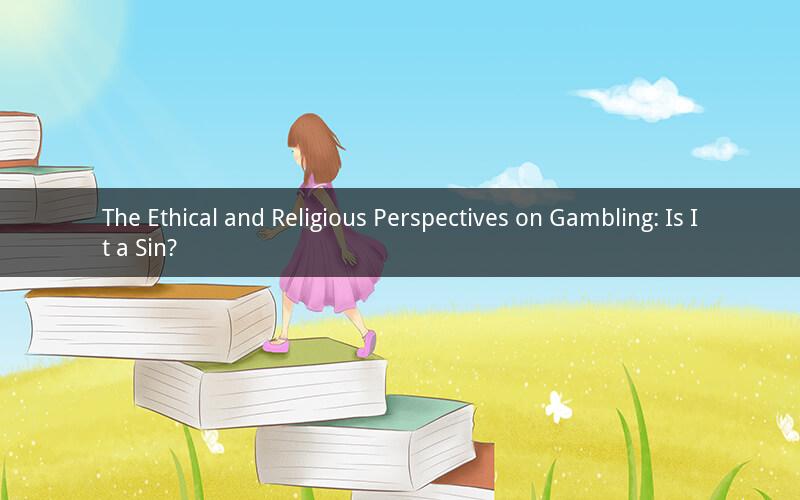
Introduction:
Gambling has been a topic of debate for centuries, with varying opinions on its moral and religious implications. This article explores the different perspectives on whether gambling is considered a sin, delving into religious teachings and ethical considerations.
1. Religious Views on Gambling:
a. Christianity:
In Christianity, the Bible does not explicitly label gambling as a sin. However, some interpretations suggest that gambling can lead to addiction and other harmful consequences, which are considered sins. The Bible encourages believers to avoid activities that can lead to destruction and harm, including gambling.
b. Islam:
In Islam, gambling is strictly prohibited. The Quran explicitly states that gambling is haram (forbidden) and is considered a sin. Muslims are advised to avoid all forms of gambling, as it is seen as a waste of time and resources.
c. Hinduism:
In Hinduism, the views on gambling vary among different schools of thought. Some believe that gambling is a sin, as it can lead to addiction and financial ruin. Others argue that gambling can be a form of entertainment, as long as it is done in moderation and without the intention of making a profit.
d. Buddhism:
Buddhism does not explicitly mention gambling as a sin. However, the concept of craving and attachment is central to Buddhist teachings. Engaging in gambling can lead to attachment and the desire for material gain, which are considered harmful in Buddhism.
2. Ethical Considerations:
a. Personal Responsibility:
One ethical perspective argues that gambling is not inherently a sin, but rather a personal choice. Individuals should be responsible for their actions and the potential consequences of their gambling habits. This perspective emphasizes the importance of self-control and personal accountability.
b. Social Impact:
Another ethical concern is the social impact of gambling. Gambling addiction can lead to financial problems, broken families, and other negative consequences. Critics argue that gambling is a form of exploitation, as it preys on vulnerable individuals and can contribute to social issues.
c. Legal and Moral Responsibility:
Some argue that gambling is a sin due to its potential for harm and the exploitation of vulnerable individuals. They believe that society has a moral responsibility to regulate and limit gambling activities to protect its citizens.
3. The Role of Government:
Governments play a crucial role in regulating gambling activities. Some argue that the government should ban gambling altogether, while others believe that it should be regulated to minimize its negative impact. The debate on the role of government in gambling highlights the ethical and moral considerations surrounding this issue.
4. The Psychological Aspect:
The psychological aspect of gambling is another important consideration. Some individuals may engage in gambling as a form of entertainment, while others may develop an addiction. Understanding the psychological factors behind gambling can help in addressing the ethical and moral implications of this activity.
5. Conclusion:
The question of whether gambling is a sin is complex and multifaceted. Different religious teachings and ethical perspectives offer varying answers. While some argue that gambling is a sin due to its potential for harm and addiction, others believe it is a personal choice and should be regulated. Ultimately, the decision on whether gambling is a sin depends on individual beliefs and values.
Questions and Answers:
1. Q: What are the main religious views on gambling?
A: The main religious views on gambling vary among different faiths. Christianity does not explicitly label gambling as a sin, while Islam strictly prohibits it. Hinduism and Buddhism have varying interpretations, with some considering gambling a sin and others not.
2. Q: How does personal responsibility play a role in the ethical debate on gambling?
A: Personal responsibility is an important ethical consideration. Individuals should be accountable for their actions and the potential consequences of their gambling habits. This perspective emphasizes self-control and personal accountability.
3. Q: What are the potential social impacts of gambling?
A: The potential social impacts of gambling include financial problems, broken families, and other negative consequences. Critics argue that gambling can contribute to social issues and exploit vulnerable individuals.
4. Q: How does the government regulate gambling?
A: Governments regulate gambling through laws and regulations. Some ban gambling altogether, while others allow it under strict regulations. The goal is to minimize the negative impact of gambling on society.
5. Q: What are the psychological factors behind gambling addiction?
A: The psychological factors behind gambling addiction include the thrill of risk, the desire for material gain, and the psychological effects of winning and losing. Understanding these factors can help in addressing the ethical and moral implications of gambling.